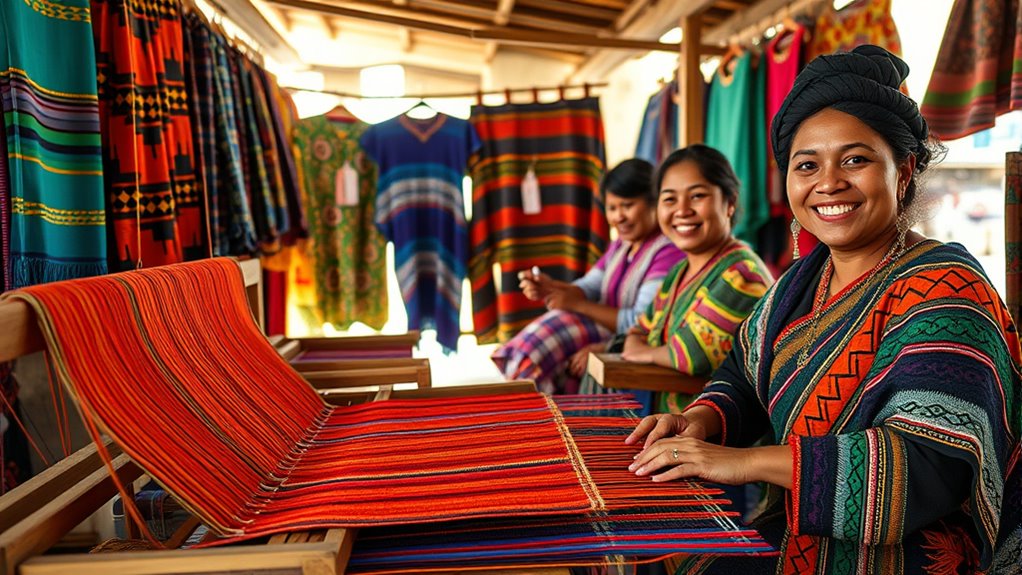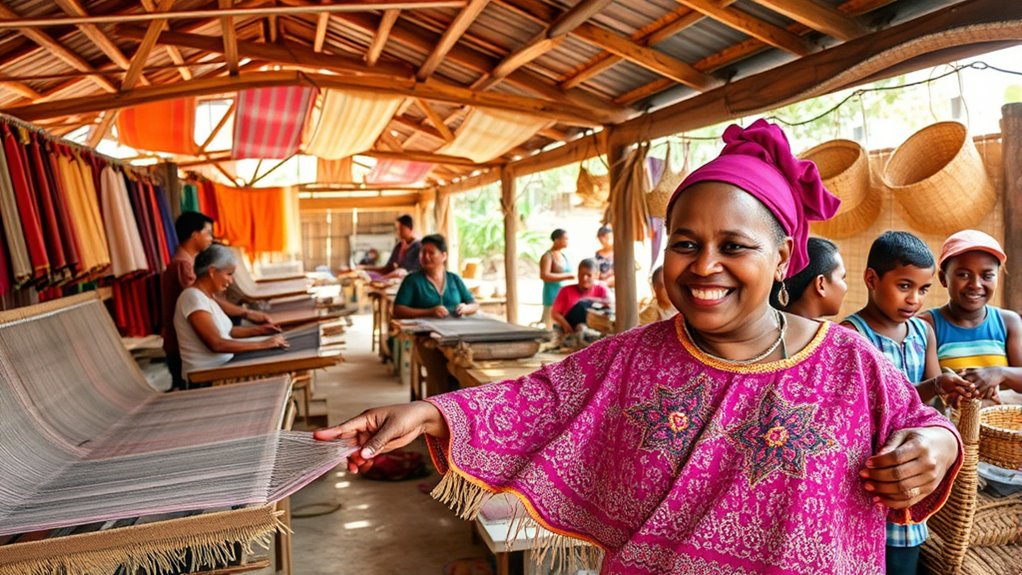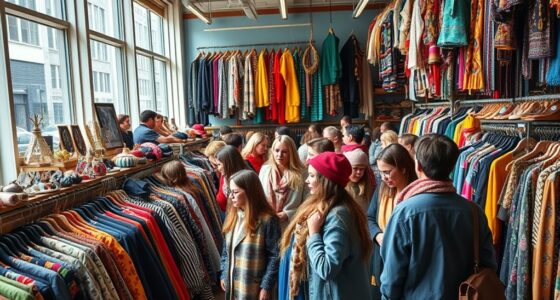Fair trade fashion empowers you to support artisans and communities by choosing ethically sourced clothing made with fair wages, sustainable practices, and cultural preservation in mind. When you opt for these products, you’re helping small-scale artisans gain economic independence, protect traditional skills, and foster environmental sustainability. Your choices influence a more responsible fashion industry that values transparency, social impact, and eco-friendly methods. Keep exploring to discover ways your wardrobe can make a positive difference.
Key Takeaways
- Fair trade fashion supports small artisans by ensuring fair wages, dignified working conditions, and fair trade practices.
- It preserves cultural heritage by promoting traditional crafts and skills passed through generations.
- Ethical sourcing minimizes environmental impact through eco-friendly materials and transparent supply chains.
- Certified fair trade fashion encourages sustainable practices that protect ecosystems and reduce waste.
- Consumers can make responsible choices that empower artisans, promote sustainability, and foster positive social change.

Have you ever wondered where your clothing comes from and who benefits from its production? When you choose fair trade fashion, you’re making a conscious decision that supports more than just stylish apparel. You’re participating in a movement that emphasizes sustainable sourcing and artisan empowerment. By opting for fair trade brands, you help ensure that the materials used are sourced responsibly, with minimal environmental impact and fair labor practices. Sustainable sourcing means that the raw materials—like organic cotton, natural dyes, or recycled fibers—are obtained in ways that protect ecosystems and reduce waste. It also involves transparent supply chains, so you know exactly where your clothes originate and how they’re made. This approach contrasts sharply with fast fashion’s often exploitative practices, where environmental degradation and worker exploitation are common. With fair trade fashion, you’re making a statement that quality and ethics matter, supporting a system that values long-term sustainability over short-term profits. Additionally, fair trade standards often include environmental certifications that help promote eco-friendly practices throughout the supply chain.
More importantly, fair trade fashion actively promotes artisan empowerment. When you purchase from these brands, you’re directly supporting small-scale artisans and craft communities around the world. These artisans often possess rich cultural traditions and skills that have been passed down through generations. However, they frequently face economic hardships and limited access to markets. Fair trade initiatives help bridge that gap by providing artisans with fair wages, better working conditions, and access to global markets. This not only sustains their craft but also preserves cultural heritage. By empowering artisans, fair trade fashion fosters economic independence, allowing these craftspeople to invest in their communities, improve their quality of life, and continue their artistic traditions. When you buy handmade products or pieces created through fair trade partnerships, you’re helping to elevate these artisans’ voices and livelihoods. Supporting ethical business practices encourages the entire industry to adopt more responsible and sustainable methods.
Choosing fair trade fashion isn’t just about the clothes you wear; it’s about making a stand for ethical business practices. It’s about supporting companies that prioritize sustainable sourcing, considering both environmental health and social impact. It’s also about recognizing the value of artisan empowerment, giving artisans the dignity and economic stability they deserve. Every time you select a fair trade item, you become part of a larger movement that champions fair wages, environmentally conscious production, and cultural preservation. Your choice can influence the fashion industry to shift toward more responsible practices, creating a ripple effect that benefits communities and the planet alike. Fair trade fashion empowers you to wear your values proudly, knowing that your clothing contributes to positive change.
Frequently Asked Questions
How Does Fair Trade Fashion Impact Local Economies Long-Term?
Fair trade fashion boosts local economies long-term by promoting sustainable growth and economic resilience. When you choose fair trade, you support artisans who earn fair wages, enabling communities to invest in infrastructure and education. This creates a cycle of prosperity, reducing reliance on external aid. Over time, these communities become more self-sufficient, fostering stability and growth that benefits everyone involved. Your support truly makes a lasting, positive impact.
What Certifications Verify a Brand’s Fair Trade Claims?
You can verify a brand’s fair trade claims through certifications like Fair Trade Certified, which follow strict fair trade standards. These certifications involve rigorous processes including audits and inspections to guarantee fair wages, ethical labor practices, and sustainable sourcing. When you see these marks, it means the brand has met certification processes that uphold fair trade standards, giving you confidence that your purchase supports ethical practices and empowers artisans and communities.
Are Fair Trade Garments More Durable Than Conventional Ones?
Fair trade garments often are more durable because they use higher fiber quality and adhere to strict manufacturing standards. When you choose fair trade clothing, you’re getting products made with better materials and ethical practices, which typically last longer than conventional options. The focus on quality and sustainability means your clothing withstands wear and tear better, giving you better value and supporting ethical practices in the fashion industry.
How Can Consumers Identify Truly Ethical Fashion Brands?
Think of truly ethical fashion brands as open books, revealing their secrets through transparent supply chains. You can spot them by checking for labels that highlight sustainable sourcing and fair trade practices. Research their stories, visit their websites, and look for certifications like Fair Trade or B Corp. When you buy from these brands, you’re planting seeds of positive change, helping artisans thrive while ensuring your wardrobe champions integrity over imitation.
What Challenges Do Artisan Communities Face Beyond Fair Trade Initiatives?
You might not realize that artisan communities face challenges like supply chain transparency issues, which make it hard to trace product origins, and threats to cultural preservation as traditional crafts fade. These communities often struggle with fair compensation, market access, and adapting to modern demands. By supporting brands that prioritize transparency and cultural respect, you help guarantee artisans preserve their heritage while thriving economically.
Conclusion
By choosing fair trade fashion, you’re not just making a style statement—you’re transforming lives. Every purchase supports artisans and communities, but the true impact goes beyond what you see. What if your next outfit could hold a story of hope, resilience, and change? The power’s in your hands. Will you take the step that could reshape the future of fashion—and countless lives along the way? The choice is yours, and the possibilities are endless.









